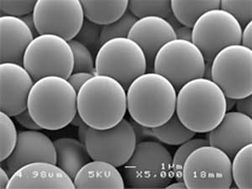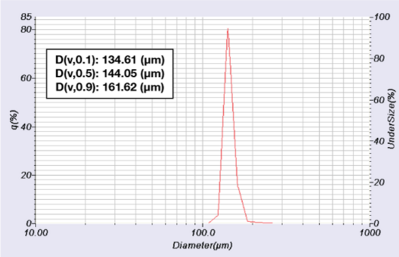

Polymers are large molecules made from repeating structural units connected by covalent chemical bonds. We often use the word ‘plastic’ to refer to polymeric materials, but polymers also include a wide range of natural materials such as proteins, DNA, cellulose, shellac and amber.
One example of a commonly synthesized polymer is polyvinyl chloride (PVC), which is used for plumbed piping, building materials, vinyl siding, and many other products with ‘vinyl’ in the name. PVC is made by polymerization of the vinyl chloride monomer and is available in many size ranges, including large flakes.
One polymer that many particle size analysts should be familiar with is polystyrene, the material often used for particle size standards. These standards are available in sizes ranging from 20 nanometers to 1,000 microns. The particle size distribution for these samples is extremely narrow, therefore classifying them as monodisperse standards. Although most polystyrene samples are suspensions, powder materials are also available – see the example result below for a dry sample measured on the LA-960V2 laser diffraction analyzer.

5 Micron Microspheres (photo courtesy of Duke Scientific)

Polystyrene Latex Powder Result from the LA-960 with PowderJet Dry Feeder

Expanded polystyrene (EPS) can be found in many areas of our daily lives due to unique properties such as low thermal conductivity. Uses for this material range from practical applications (thermal insulation and noise dampening in building construction, and the manufacture of packaging for foodstuffs) to fun, niche markets (surfboard construction). The particle size range of EPS spheres covers 0.1 to approximately 3 millimeters.
Dynamic Image Analysis
Direct Imaging Particle Analyzer
나노입자 분석기
원심 나노 입자 분석기
레이저 산란 입자 크기 분포 분석기
레이저 회절 입도 분포 분석기
BET Flowing Gas Surface Area Analyzers
BET Surface Area Analyzers
나노 입자 분석기
멀티 레이저 나노 입자 추적 분석기
HORIBA제품의 자세한 정보를 원하시면, 아래의 양식에 내용을 입력을 부탁드립니다.